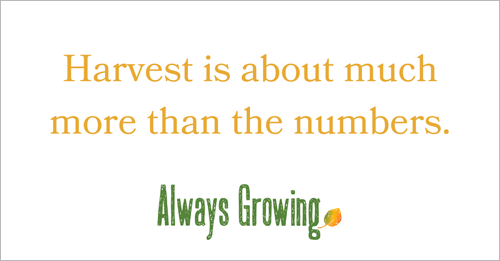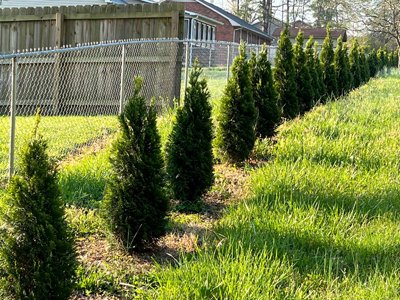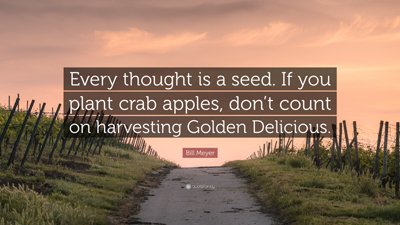Seven Laws Of The Harvest Followed By Successful Leaders
As I write this blog, I can see in the distance a row of American Arborvitae Lisa and I planted three years ago. The evergreens have a beautiful shape and color as you can see from this recent photo, and as of today, only three of the 49 we planted have died. I should be happy with my “harvest results”… but I’m not. They aren’t tall enough! And it’s my fault. I violated Harvest Law #2: You harvest the same thing that you plant.
We purchased the evergreens to serve as a screen to an adjacent property. In my haste to buy them I chose a variety that only grows 6-9 inches per year versus the 3-4 feet per year I really wanted. To replant them now would be costly and frankly, not worth the effort. I’ll just have to wait longer for my natural “green screen.”
I see leaders experience a similar dilemma. They aren’t as thoughtful as they could be about the choices they make in their role and they end up getting results that, well, fall short… like my evergreens. Others follow timeless principles, whether knowingly or not, that I believe correspond to the work of a successful gardener.
If you’re ready to get serious about improving the success of your team, commit the following seven Laws of The Harvest to memory as you start and work through your growing season.
Law #1 You can only harvest what you plant.
In the past week you have probably thought about a member of your team and thought, “I wish __________________ (insert name of team member) was more ________________ (insert desired skill, attitude, or perspective).” The question is, what have you done to initiate that growth in them?
Or if it’s your own growth you are thinking about, what steps have you taken to move forward? The only seeds I know that do a good job of planting themselves are weeds. And that’s what you don’t want, right?
Question: What are some actions I could take to grow myself or my team that I have been putting off?
Law #2 You harvest the same thing that you plant.
It seems so simplistic to say that when you plant cucumber seeds you will get cucumbers. While it might seem obvious in gardening, I don’t believe all leaders translate it to their work.
If you lead in such a way that plants unhealthy stress on your team, you’re going to harvest results that reflect that stress. If you aren’t communicating clear expectations to everyone on your team, you’re going to harvest outcomes that show that your team didn’t have the clarity they needed to deliver their best work.
On a more positive note, if you lead in such a way that every team member understands their value to the team, your harvest will more likely reflect their best efforts.
Question: What are the positive or negative harvests I am seeing with my team that are due to how I have led them the past few months?
Law #3 Your harvest comes after the planting.
When your hectic workdays have reduced you to putting out the next fire, you get conditioned to seeing the results of your efforts almost immediately. That can cause you to discount investing your time in activities that won’t show a benefit for a long(er) period of time.
Before you default back to the immediate gratification activities, give yourself the space to reflect on the value of what you will be harvesting later. This might include:
Reduced stress for you and/or a team member
Achieving a goal that the team has struggled to accomplish in the past
Healthier team working environment
Question: What is an investment of my time that won’t pay off tomorrow, but will yield a harvest in 30-60 days?
Law #4 Your harvest depends on more than planting.
Planting is exciting. Thinking about how you will enjoy a fresh home-grown tomato or a juicy ear of corn can certainly motivate you to take the initial step of planting seeds or seedlings. That’s the easy part.
The real work comes with the consistent care you provide to the plants. The same is true of leadership success. It’s the day-to-day actions you take to keep your team thriving that will determine whether your harvest is a success… or is diminished due to a lack of care.
Question: What are the daily or weekly actions I can take to consistently help grow my team?
Law #5 Your harvest is bigger than your planting.
One tomato seed might grow only one plant, but that plant will average 20-30 tomatoes. One seed of anything planted has the potential to yield exponential results.
Doing the work to grow one or more members of your team always has more benefits than the one you intended. Think about a simple “planting” like delegation. It not only creates physical and mental space for you to work more strategically, but it also boosts the confidence of that team member, improves the quality of their work, and demonstrates to others that they too need to practice delegation.
Question: What is one action I could take to improve my team that would have multiple benefits?
Law #6 Your harvest is proportional to your planting.
If you make a casual investment in the growth of your team, you can expect one level of harvest. If instead you make the growth of your team your number one priority, your harvest will look very different. What’s the level of success you are looking for with your team? Once you know that, you can decide what your commitment level to their growth needs to be.
Question: What level of investment am I willing to make to grow my team?
Law #7 You harvest today what you planted yesterday.
When coaching leaders I often hear of all the challenges they are facing with their team. At one point I will normally ask them, “How have you contributed to their lack of success?” It’s a powerful moment because they have to get honest about how their actions (planting) in the past have created these results (harvest).
Successful gardeners know that once the harvest has occurred there is nothing they can do to change it. Complaining or beating themselves up about what they should have done won’t change the outcome.
The best use of their time is to reflect on the actions they took, determine a better plan for next year’s harvest, and start implementing that plan today.
Question: What is your current harvest of results telling you? What’s your plan for your next growing season?
As I finish working on these seven, I’m thinking I may need to add an eighth one: Your harvest isn’t completely dependent on your efforts. Like gardening, there are circumstances like drought, disease, or pests that you couldn’t fully prepare for.
It’s in those moments mature gardeners ask themselves the question, “Did I do everything I could to make things grow?” It’s a question leaders need to be able to answer as well.
Which Law of The Harvest is most important for you to remember?









